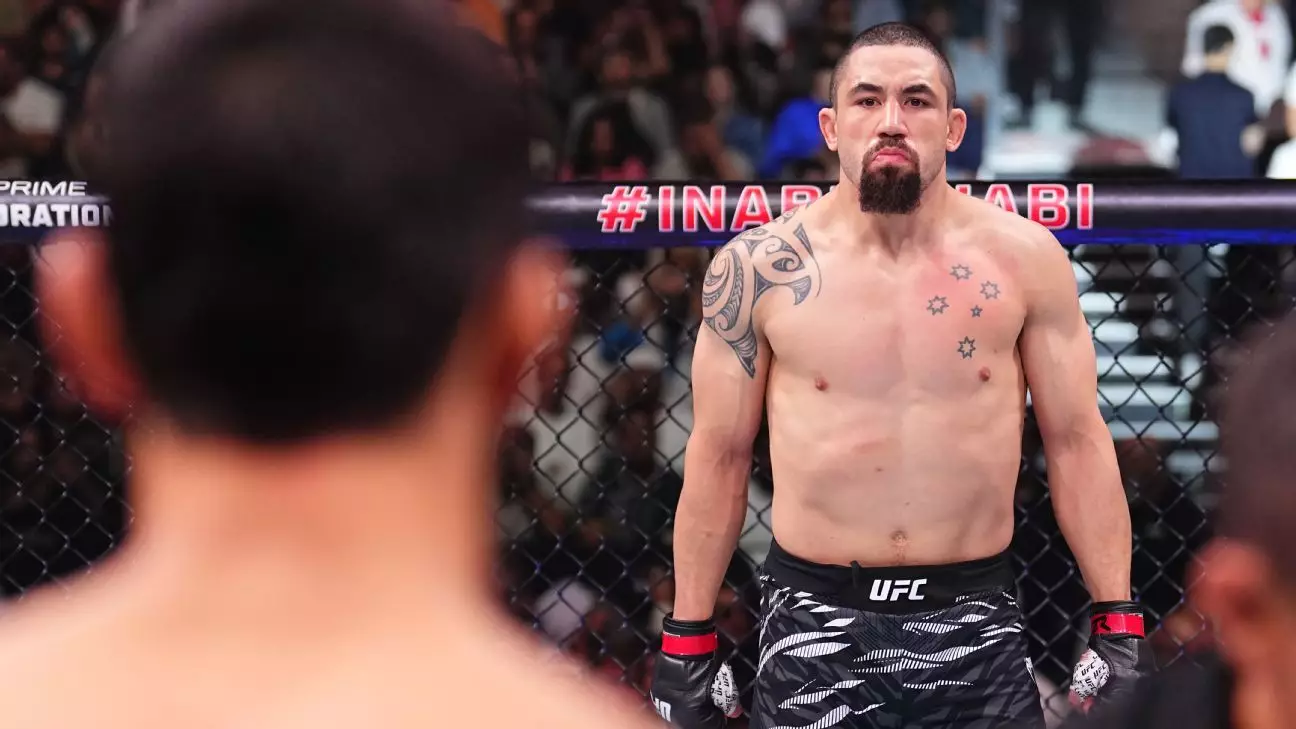The upcoming UFC Fight Night in Abu Dhabi signifies more than just another set of mixed martial arts contests; it’s a pivotal moment for fighters seeking to cement their legacies and redefine their trajectories. The evening’s headline bout, featuring Robert Whittaker versus Reinier de Ridder, encapsulates this essence perfectly. Whittaker, a former champ with undeniable skill and experience, enters the octagon against de Ridder, a fast-rising contender who has yet to prove himself consistently at the highest levels. This fight isn’t just about winning rounds; it’s about whether de Ridder can demonstrate he belongs among the elite, and if Whittaker can remind the division why he was once unstoppable.
The significance lies in the psychological and career implications. For Whittaker, this bout offers a chance at redemption after a tough loss to Khamzat Chimaev — a defeat that tested his resilience and self-belief. For de Ridder, it’s an opportunity to elevate his status from a promising newcomer to a serious threat capable of competing with the best. The outcome of this fight will resonate throughout the middleweight division, potentially altering rankings and title picture. At stake is more than pride; it is the next step toward championship contention for one of the UFC’s most talented fighters.
The Clash of Styles and the Battle of Wills
In analyzing this matchup, it’s crucial to recognize the contrasting styles and what they reveal about both fighters’ minds. Whittaker’s approach is rooted in precise striking, experience, and adaptability. He thrives in long, grueling battles where he can impose his wrestling-based fight if needed, but his striking remains his primary weapon. His past performances demonstrate a fighter who can read opponents’ rhythms and adapt mid-fight, making him one of the most multifaceted middleweights in the UFC.
De Ridder, on the other hand, is celebrated for relentless pressure and exceptional grappling. His victory streak in UFC so far showcases an aggressive, forward-pressing style that has overwhelmed opponents with submissions and ground control. But whether his grappling can neutralize Whittaker’s striking remains a question mark. His lack of experience in longer fights is a concern, especially as Whittaker excels in championship rounds. De Ridder’s ability to impose his wrestling game early will be vital, but it’s uncertain whether he can sustain it against a fighter with Whittaker’s resourcefulness.
The narrative of this contest transcends techniques; it’s a battle of wills. Will de Ridder’s relentless pressure break the seasoned veteran? Or will Whittaker’s adaptability and striking precision be enough to withstand early threats and dominate as the fight progresses? The answer could determine the trajectory of their careers—not just who wins, but who adapts, who resists, and who ultimately prevails.
The Power of Mindset and Resilience in Fighting
A deeper layer of this event involves understanding the mental fortitude required to thrive in such high-stakes environments. Fighters like Whittaker have faced setbacks and have the resilience built from years of top-tier competition. His recent loss might serve as motivation or a stumbling block, depending on his mental state leading into the fight. Conversely, de Ridder’s rapid ascent and undefeated streak might induce complacency if he perceives this fight as an inevitable step up, but it’s anything but.
The psychological aspect often proves decisive. A fighter’s ability to maintain composure, adapt, and push through adversity can determine outcomes that technical assessments alone cannot predict. Whittaker’s experience fighting at the highest level gives him an edge, especially in high-pressure moments. Meanwhile, de Ridder’s confidence is sprouting from his undefeated streak and recent dominant performances, which could either bolster his mental strength or become overconfidence.
This fight embodies the importance of mindset in MMA. The fighters aren’t merely competing against each other; they are battling their doubts, fears, and limitations. Victory isn’t solely about landing more punches or controlling positions; it’s about who can stay mentally flexible and resilient when everything is on the line.
Implications Beyond the Octagon
This event also exemplifies how MMA is evolving into a sport where moments can catapult fighters into superstardom or send careers into unforeseen directions. Las Vegas and Abu Dhabi have become iconic backdrops for these defining moments, offering fighters a platform to either solidify their legacy or face abrupt setbacks.
The narrative surrounding Whittaker versus de Ridder will extend beyond the fight itself, influencing how fighters prepare for big stages, how fans perceive rising stars, and how pundits dissect what it means to truly compete at the top. For de Ridder, a victory could erase doubts about his transition from other promotions and establish him as a bona fide top contender. For Whittaker, a win reaffirms his place among middleweight legends and possibly sets the stage for another title shot.
In essence, this fight symbolizes the power of opportunity in MMA. It’s about seizing the moment—a concept that resonates beyond the cage. Just as a single strike or a strategic grapple can change the course of a fight, so too can the intangible qualities of resolve, confidence, and adaptability redefine a fighter’s destiny. Abu Dhabi’s UFC Fight Night isn’t just an event; it’s a crucible where legacies are forged and broken, reminding fighters and fans alike why this sport remains one of the most compelling spectacles in the world.


Leave a Reply